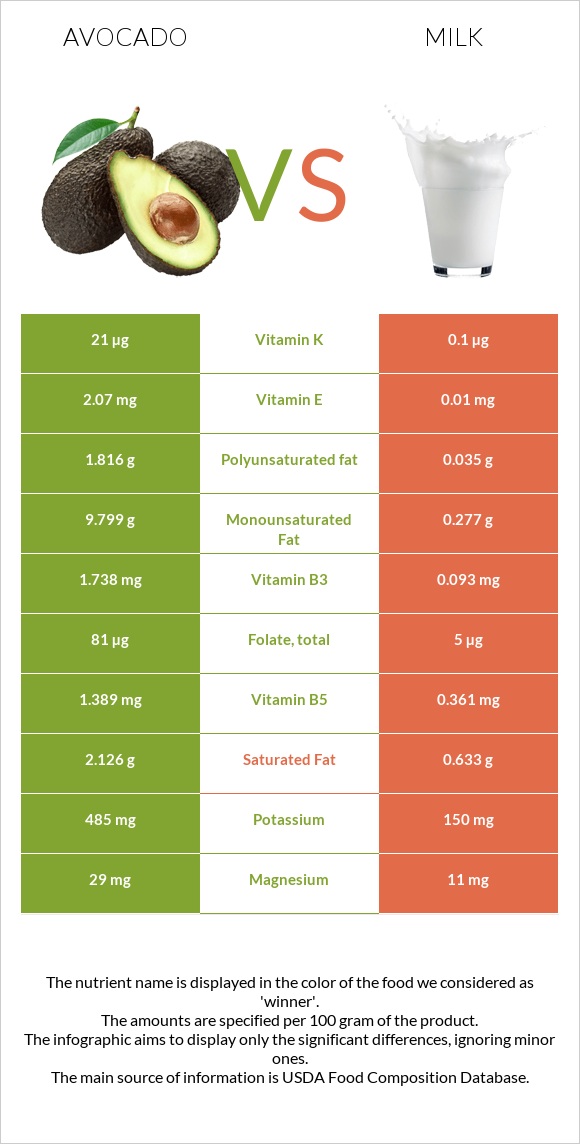Avocado vs. Milk — In-Depth Nutrition Comparison
Compare
How are avocados and milk different?
- Avocados are higher in fiber, vitamin B5, copper, folate, vitamin K, vitamin B6, vitamin E, and vitamin C; however, milk is richer in vitamin B12 and calcium.
- Daily need coverage for fiber for avocados is 27% higher.
Avocados, raw, all commercial varieties and Milk, lowfat, fluid, 1% milkfat, with added vitamin A and vitamin D are the varieties used in this article.
Infographic

Infographic link
Mineral Comparison
Mineral comparison score is based on the number of minerals by which one or the other food is richer. The "coverage" charts below show how much of the daily needs can be covered by 300 grams of the food.
| Contains more MagnesiumMagnesium | +163.6% |
| Contains more PotassiumPotassium | +223.3% |
| Contains more IronIron | +1733.3% |
| Contains more CopperCopper | +1800% |
| Contains more ZincZinc | +52.4% |
| Contains less SodiumSodium | -84.1% |
| Contains more ManganeseManganese | +4633.3% |
| Contains more CalciumCalcium | +941.7% |
| Contains more PhosphorusPhosphorus | +82.7% |
| Contains more SeleniumSelenium | +725% |
Vitamin Comparison
Vitamin comparison score is based on the number of vitamins by which one or the other food is richer. The "coverage" charts below show how much of the daily needs can be covered by 300 grams of the food.
| Contains more Vitamin CVitamin C | +∞% |
| Contains more Vitamin EVitamin E | +20600% |
| Contains more Vitamin B1Vitamin B1 | +235% |
| Contains more Vitamin B3Vitamin B3 | +1768.8% |
| Contains more Vitamin B5Vitamin B5 | +284.8% |
| Contains more Vitamin B6Vitamin B6 | +594.6% |
| Contains more Vitamin KVitamin K | +20900% |
| Contains more FolateFolate | +1520% |
| Contains more Vitamin AVitamin A | +728.6% |
| Contains more Vitamin DVitamin D | +∞% |
| Contains more Vitamin B2Vitamin B2 | +42.3% |
| Contains more Vitamin B12Vitamin B12 | +∞% |
All nutrients comparison - raw data values
| Nutrient |  |
 |
DV% diff. |
| Fiber | 6.7g | 0g | 27% |
| Monounsaturated fat | 9.799g | 0.277g | 24% |
| Fats | 14.66g | 0.97g | 21% |
| Vitamin B5 | 1.389mg | 0.361mg | 21% |
| Copper | 0.19mg | 0.01mg | 20% |
| Vitamin B12 | 0µg | 0.47µg | 20% |
| Folate | 81µg | 5µg | 19% |
| Vitamin B6 | 0.257mg | 0.037mg | 17% |
| Vitamin K | 21µg | 0.1µg | 17% |
| Vitamin E | 2.07mg | 0.01mg | 14% |
| Polyunsaturated fat | 1.816g | 0.035g | 12% |
| Vitamin C | 10mg | 0mg | 11% |
| Calcium | 12mg | 125mg | 11% |
| Potassium | 485mg | 150mg | 10% |
| Vitamin B3 | 1.738mg | 0.093mg | 10% |
| Iron | 0.55mg | 0.03mg | 7% |
| Saturated fat | 2.126g | 0.633g | 7% |
| Calories | 160kcal | 42kcal | 6% |
| Vitamin D | 0 IU | 48 IU | 6% |
| Phosphorus | 52mg | 95mg | 6% |
| Vitamin A | 7µg | 58µg | 6% |
| Vitamin D | 0µg | 1.2µg | 6% |
| Manganese | 0.142mg | 0.003mg | 6% |
| Selenium | 0.4µg | 3.3µg | 5% |
| Magnesium | 29mg | 11mg | 4% |
| Vitamin B1 | 0.067mg | 0.02mg | 4% |
| Vitamin B2 | 0.13mg | 0.185mg | 4% |
| Protein | 2g | 3.37g | 3% |
| Cholesterol | 0mg | 5mg | 2% |
| Zinc | 0.64mg | 0.42mg | 2% |
| Sodium | 7mg | 44mg | 2% |
| Carbs | 8.53g | 4.99g | 1% |
| Choline | 14.2mg | 17.7mg | 1% |
| Net carbs | 1.83g | 4.99g | N/A |
| Sugar | 0.66g | 5.2g | N/A |
| Starch | 0.11g | 0% | |
| Tryptophan | 0.025mg | 0.043mg | 0% |
| Threonine | 0.073mg | 0.143mg | 0% |
| Isoleucine | 0.084mg | 0.174mg | 0% |
| Leucine | 0.143mg | 0.319mg | 0% |
| Lysine | 0.132mg | 0.282mg | 0% |
| Methionine | 0.038mg | 0.088mg | 0% |
| Phenylalanine | 0.097mg | 0.174mg | 0% |
| Valine | 0.107mg | 0.22mg | 0% |
| Histidine | 0.049mg | 0.101mg | 0% |
| Fructose | 0.12g | 0g | 0% |
| Omega-3 - ALA | 0.111g | 0.004g | N/A |
| Omega-6 - Gamma-linoleic acid | 0.015g | N/A | |
| Omega-6 - Linoleic acid | 0.027g | N/A |
Macronutrient Comparison
Macronutrient breakdown side-by-side comparison
| Contains more FatsFats | +1411.3% |
| Contains more CarbsCarbs | +70.9% |
| Contains more OtherOther | +110.7% |
| Contains more ProteinProtein | +68.5% |
| Contains more WaterWater | +22.8% |
Fat Type Comparison
Fat type breakdown side-by-side comparison
| Contains more Mono. FatMonounsaturated fat | +3437.5% |
| Contains more Poly. FatPolyunsaturated fat | +5088.6% |
| Contains less Sat. FatSaturated fat | -70.2% |
Carbohydrate type comparison
Carbohydrate type breakdown side-by-side comparison
| Contains more StarchStarch | +∞% |
| Contains more SucroseSucrose | +∞% |
| Contains more GlucoseGlucose | +∞% |
| Contains more FructoseFructose | +∞% |
| Contains more GalactoseGalactose | +∞% |
| Contains more LactoseLactose | +∞% |
~equal in
Maltose
~0g





